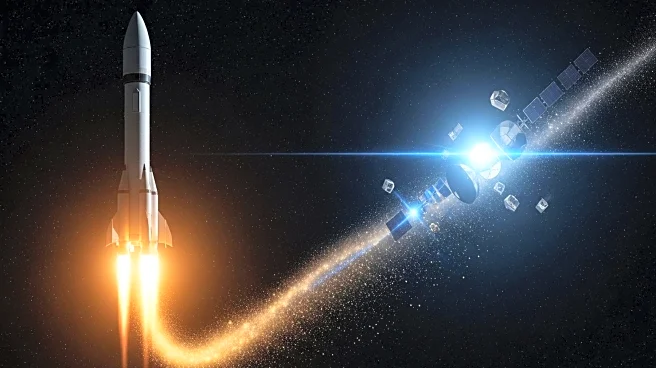What's Happening?
SpaceX successfully launched 28 Starlink satellites aboard a Falcon 9 rocket from Vandenberg Space Force Base in California on October 7, 2025. This marks the 29th launch of the Falcon 9 rocket this year, just one shy of the company's reuse record. The rocket's first stage landed in the Pacific Ocean on the SpaceX drone ship 'Of Course I Still Love You' approximately 8.5 minutes after liftoff. The upper stage continued to carry the satellites to low Earth orbit, deploying them about 60 minutes post-launch. This mission contributes to the expansion of the Starlink network, which is the largest satellite constellation ever assembled, with over 8,500 operational satellites currently in orbit.
Why It's Important?
The continued expansion of the Starlink network is significant for global internet connectivity, particularly in remote and underserved areas. SpaceX's ability to frequently reuse its Falcon 9 rockets demonstrates advancements in cost-effective space travel, potentially lowering the barrier for future satellite launches and space exploration missions. The growth of Starlink also impacts the telecommunications industry, offering competition to traditional internet service providers and potentially driving innovation and price adjustments. Additionally, the success of these launches underscores SpaceX's role in advancing commercial spaceflight capabilities.
What's Next?
SpaceX is expected to continue its aggressive launch schedule, further expanding the Starlink constellation. This could lead to increased global internet coverage and improved service quality. The company may also focus on breaking its reuse record, enhancing the efficiency and sustainability of its launch operations. As the network grows, regulatory and environmental considerations may arise, prompting discussions on space traffic management and satellite deorbiting strategies.
Beyond the Headlines
The rapid deployment of Starlink satellites raises questions about space debris and the long-term sustainability of satellite constellations. As more satellites are launched, the risk of collisions and the need for effective space traffic management become increasingly important. Additionally, the expansion of satellite internet services could influence global internet governance and data privacy policies, as more regions gain access to high-speed connectivity.









